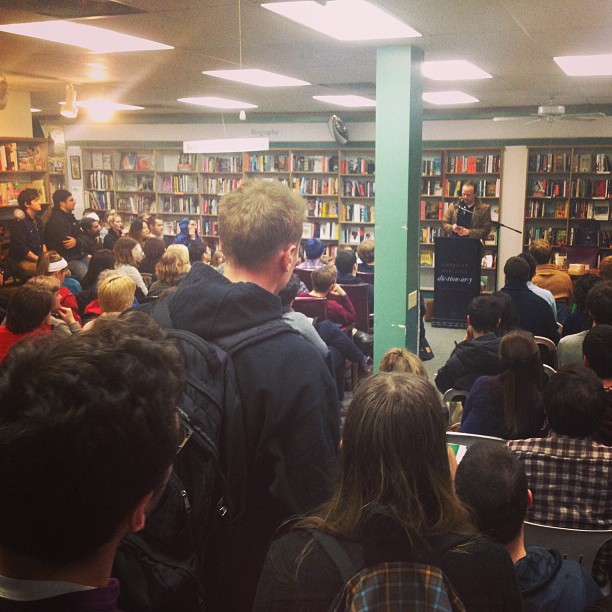By Denise Jarrott
Listen: John Jeremiah Sullivan reading | Feb. 4, 2013
There are very few readings I have been to where there are so many people present that the venue feels like an occupied space -- as if everyone present is camped out in a bookstore or gallery, waiting for the apocalypse to begin. But it isn't the end of the world, it is just a group of people passionate enough about literature that we are willing to sit on the floor around the podium, or cramped into awkward spaces, or standing in the background. Listening becomes an act of love.
People from all genres, all ages -- undergrad, graduate, people from the community -- gathered to listen to John Jeremiah Sullivan read at Prairie Lights this Monday, February 4th. Perhaps it is something about the genre of nonfiction that draws all kinds, or perhaps it is something about the openness with which Sullivan approaches his subjects.
Lucas Mann, my nonfiction seminar teacher and coworker, presented an introduction that showcased his own writing skills, but did not subtract from his admiration of Sullivan's work. Mann proclaimed Sullivan's work as "an escape from mundane, lazy writing." From what the audience was about to hear, we realized Mann was correct: Sullivan is a man who is so dedicated to his craft that he speaks exactly how he writes: honest, beautifully constructed sentences just seem to come directly from his mind.

First, Sullivan read notes from a biography he has been working on since the publication of his essay collection Pulphead in 2011. Sullivan's subject is a historical figure from the 18th century, before America became its own country. Sullivan described the events that took place during the month of January in 1737: a winter that occurred during what meteorologists describe as "the mini Ice Age." The cold drew people to "The Great Awakening," an evangelical movement that swept the colonies. In one of these churches from this time period, the cold caused the wooden church to moulder, and during a sermon at one specific church, the floor caved in. When Sullivan said, "No one died. The event was considered a miracle," the audience breathed a collective sigh for people who lived hundreds of years before us.
Sullivan's raw yet compelling facts included King George II's death, Stradivarius violins, Benjamin Franklin's scientific breakthroughs, and hilariously mimetic tavern slang (Sullivan laughed as he read 18th century euphemisms for intoxication: "he sees the bears", "he has been free with the creature.") These stunning details peppered Sullivan's research into an extraordinary month in an extraordinary time.
Next, Sullivan read from an essay from Pulphead entitled "Unknown Bards," in which he described his research into Bluegrass music. In the essay, Sullivan describes the discussion about the muddled song lyrics with a bluegrass enthusiast miles away "at a welfare motel in Portland, Oregon." Suffice it to say, from Sullivan's description of the music as "strangeweird" (one word), and "music played for drunken field hands," and the deeply tragic lives and darkly poetic lyrics of musicians Skip James and Geeshie Wiley, we all go home and scan the Internet for these songs. We wanted to hear the fuzz on the record, descend into basements or estate sales, anything to get only a glimpse of the artistry Sullivan described in a voice that sounded as if he wanted, more than anything, to haunt us.
Photo of the reading by zhostfacekilla